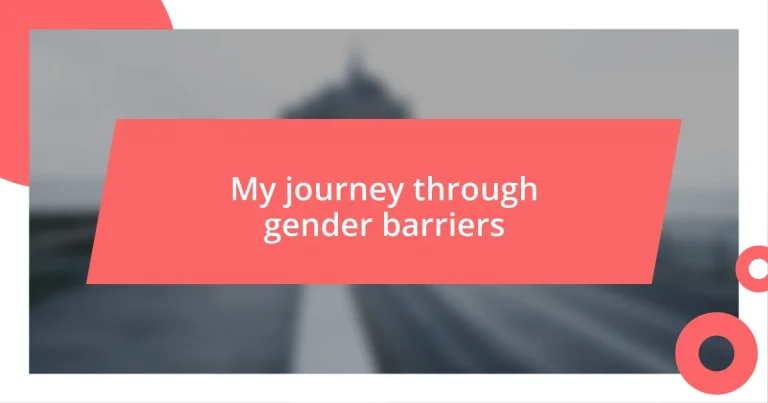Key takeaways:
- Experiencing gender barriers in predominantly male environments led to self-doubt and the realization of the need for self-advocacy and resilience.
- Stereotypes influenced both personal perceptions and external views, impacting confidence and limiting opportunities, particularly in STEM fields.
- Building supportive networks through mentorship and shared experiences fosters empowerment, encourages risk-taking, and reinforces the importance of collective celebration of achievements.
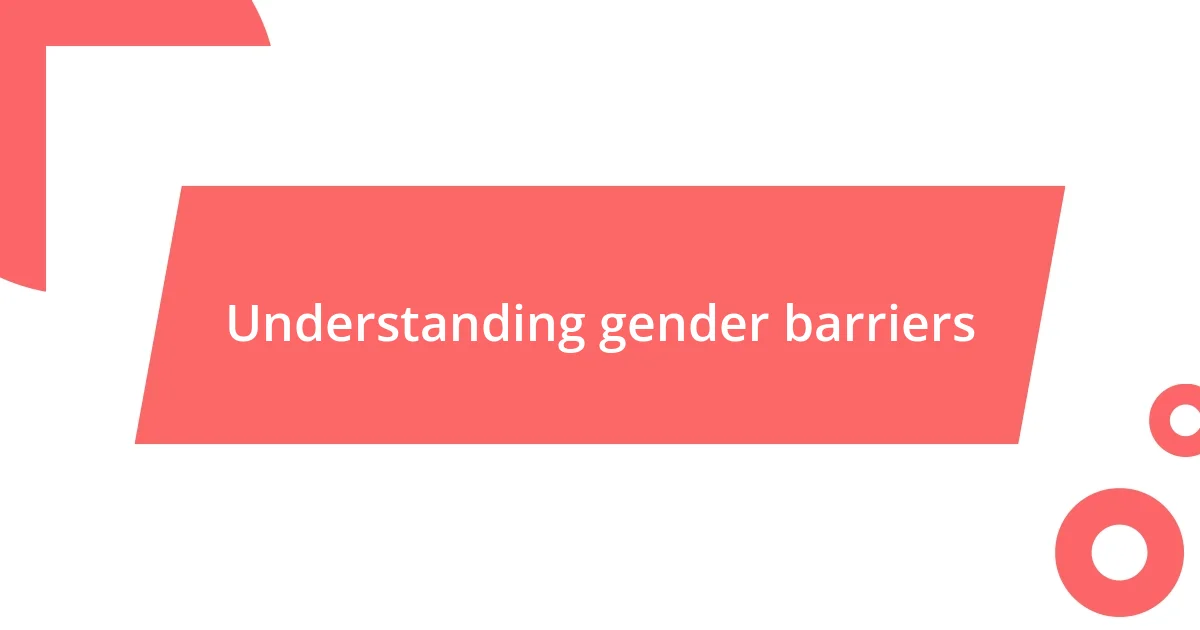
Understanding gender barriers
Gender barriers are often deeply ingrained in our social structures and can manifest in various ways, impacting people at every stage of life. I remember a time in college when I felt the weight of those barriers firsthand. As a young woman navigating a predominantly male environment in engineering classes, I often questioned if my voice truly mattered or if I was just a token representation.
These barriers can be surprisingly subtle and insidious. Have you ever experienced a moment where you didn’t feel confident enough to speak up due to assumptions about your abilities? I vividly recall a meeting at my first job, where I hesitated to share my ideas, simply because my male colleagues seemed more assertive. It was a stark reminder of how gender perceptions can overshadow our capabilities and contributions.
Understanding these barriers requires not only personal reflection but also a commitment to fostering environments where everyone can thrive. I’ve found that discussing these experiences with others can unveil shared struggles and lead to collective empowerment. So, how can we challenge these barriers together? The journey begins with open conversations and the willingness to listen and learn from one another.
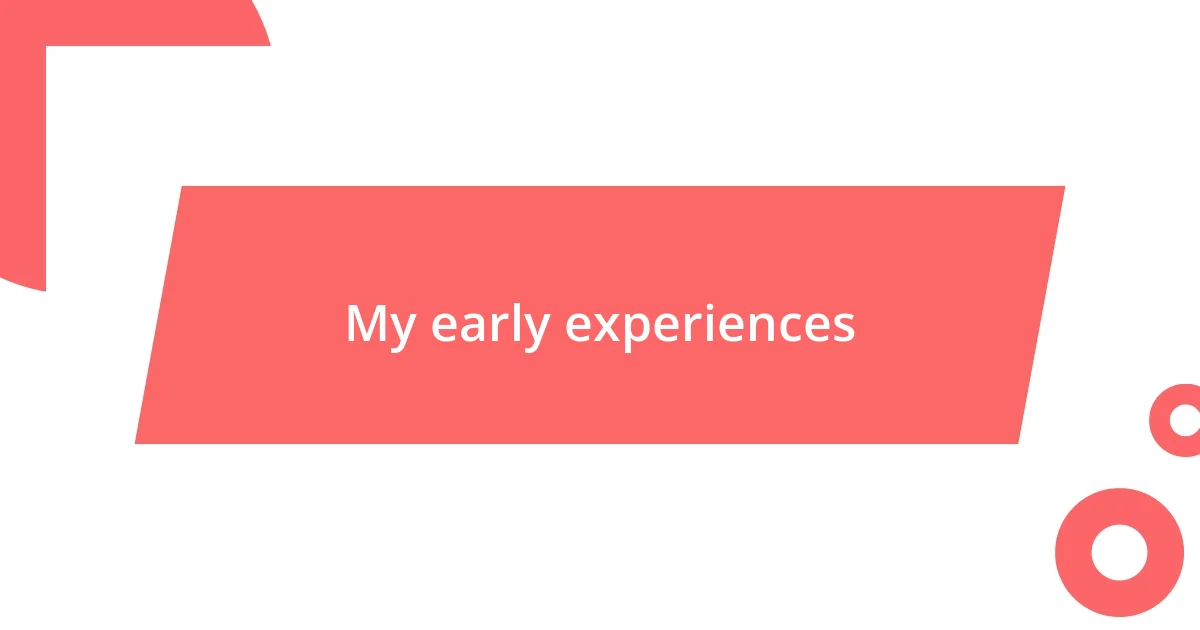
My early experiences
In my early experiences, the unmistakable weight of gender expectations began to shape my world. I remember feeling a mix of excitement and trepidation as I stepped into my first robotics competition. Surrounded by predominantly male peers, I couldn’t shake the feeling that my presence was more of a curiosity than an extension of my skills. That day highlighted a crucial lesson: the nerves I felt stemmed not just from competition, but from the unspoken pressure to prove myself in a space where I was underrepresented.
Reflecting on those formative years, several pivotal moments stand out:
– Receiving skeptical looks during group projects when I suggested unconventional ideas.
– Being overlooked in discussions, which often led me to second-guess my insights.
– The overwhelming rush of pride when a professor praised my work, reminding me that my voice had value despite the barriers I faced.
These experiences planted the seeds of resilience in me, teaching me that self-advocacy is an essential skill, one I would refine over the years.
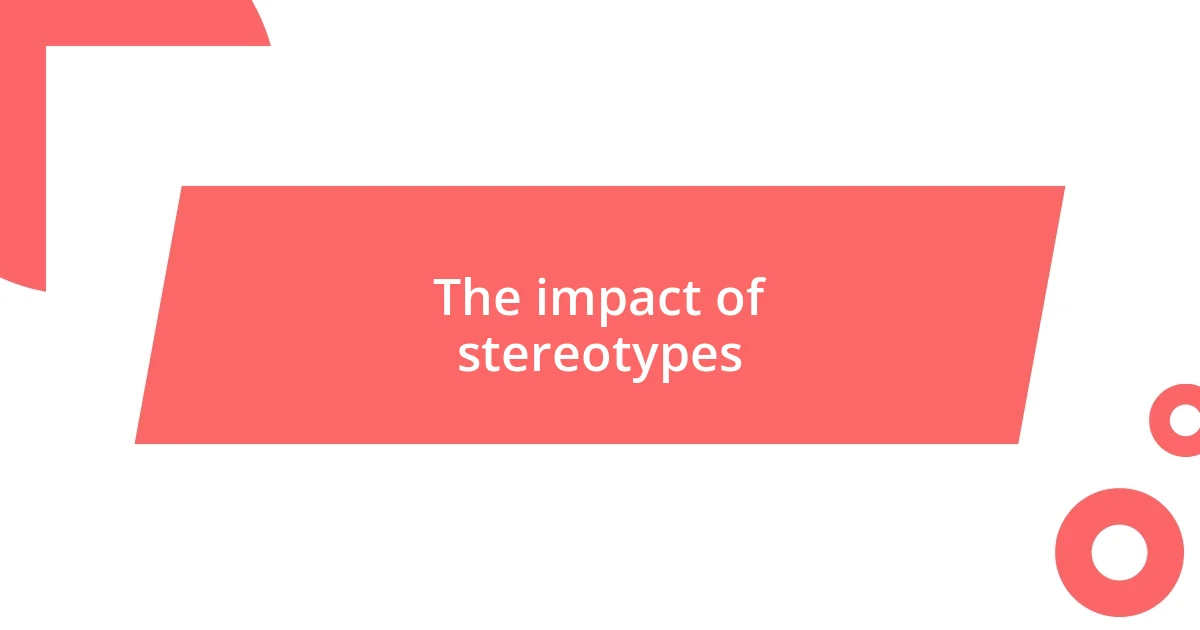
The impact of stereotypes
The impact of stereotypes can be profound and multifaceted. I recall a specific incident during a team project where the assumption of my abilities was based solely on my gender. When the task of presenting our findings arose, I was met with surprise when I volunteered. It was an eye-opener for me—the moment showcased that society often allocates roles based on outdated perceptions.
Stereotypes not only shape how others perceive us but can also alter how we view ourselves. I used to find myself underestimating my capabilities due to the stereotypical image of what a leader should be. In one memorable team meeting, instead of confidently sharing my ideas, I suppressed my thoughts, worried I wouldn’t be taken seriously. That experience highlighted how deeply these stereotypes can infiltrate our self-esteem and decision-making.
I have also witnessed stereotypes impacting my peers. One of my friends, a brilliant coder, often faced the stereotype that women were less skilled in tech. Sadly, she allowed that notion to limit her confidence, leading her to apply for fewer jobs than she was qualified for. These stories illustrate how stereotypes create barriers that extend far beyond individual experiences, affecting entire communities.
| Stereotype | Impact |
|---|---|
| Professional competence | Assumptions can overshadow qualifications, causing women to second-guess their abilities. |
| Leadership roles | Stereotypical views limit women’s participation, leading to reduced representation in decision-making positions. |
| Technical skills | Preconceived notions of gender affect engagement in STEM fields, limiting opportunities for women and girls. |
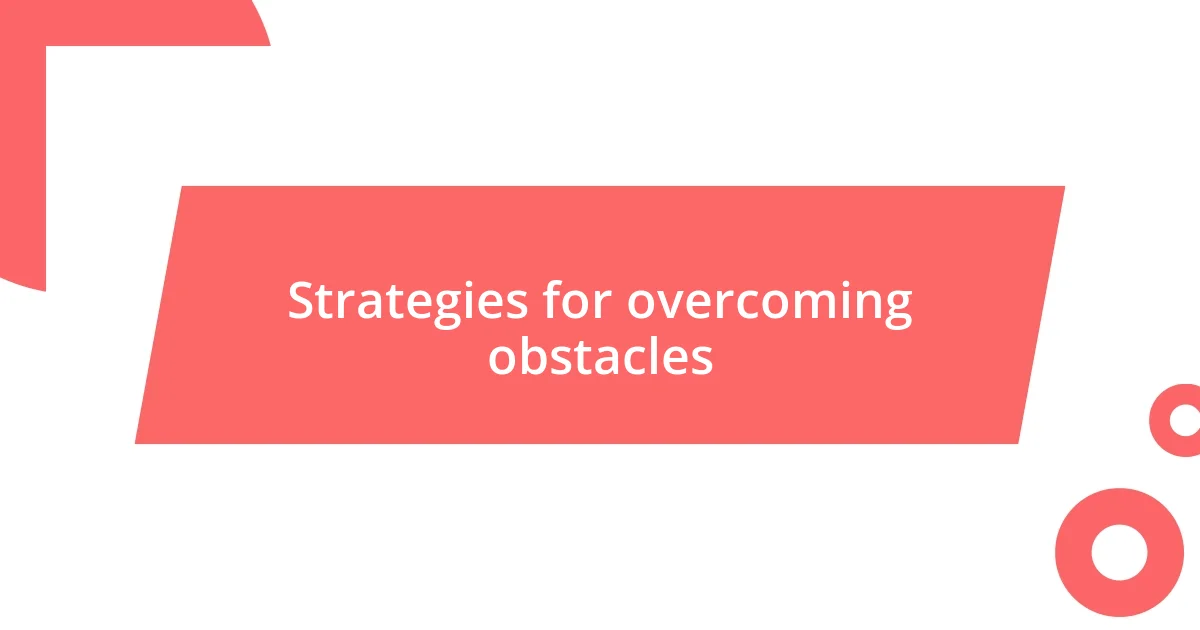
Strategies for overcoming obstacles
Navigating through gender barriers requires practical strategies, and I’ve learned to embrace them along the way. One of the most effective ways I’ve found is to seek out supportive communities. For example, when I connected with a local women’s coding group, I finally found a safe space where I could share my ideas without fear of judgment. It was empowering to see other women facing similar challenges, and that camaraderie gave me the confidence to voice my thoughts more boldly in mixed-gender settings.
Another strategy I adopted was resilience-building through continuous learning. I remember attending workshops on public speaking and negotiation skills, which significantly boosted my confidence. It was enlightening to witness how practical skills could directly counter the implicit biases I faced. Have you ever tried a course that transformed your outlook? For me, these experiences not only honed my skills but also helped me reclaim my narrative, shifting the focus from what I supposedly lacked to what I could offer.
Lastly, self-advocacy plays a crucial role in overcoming obstacles. I vividly recall a time when I had to negotiate for a leadership role in a project that I helped initiate. Instead of retreating when met with reluctance, I explained the unique perspective I brought to the table. I felt a twinge of fear, but pushing through taught me that advocating for oneself is not just about demanding a seat at the table; it’s about creating a space where your ideas can thrive. Defining and asserting my worth has been a game-changer, and I encourage everyone to do the same. Isn’t it time we all recognized our value?
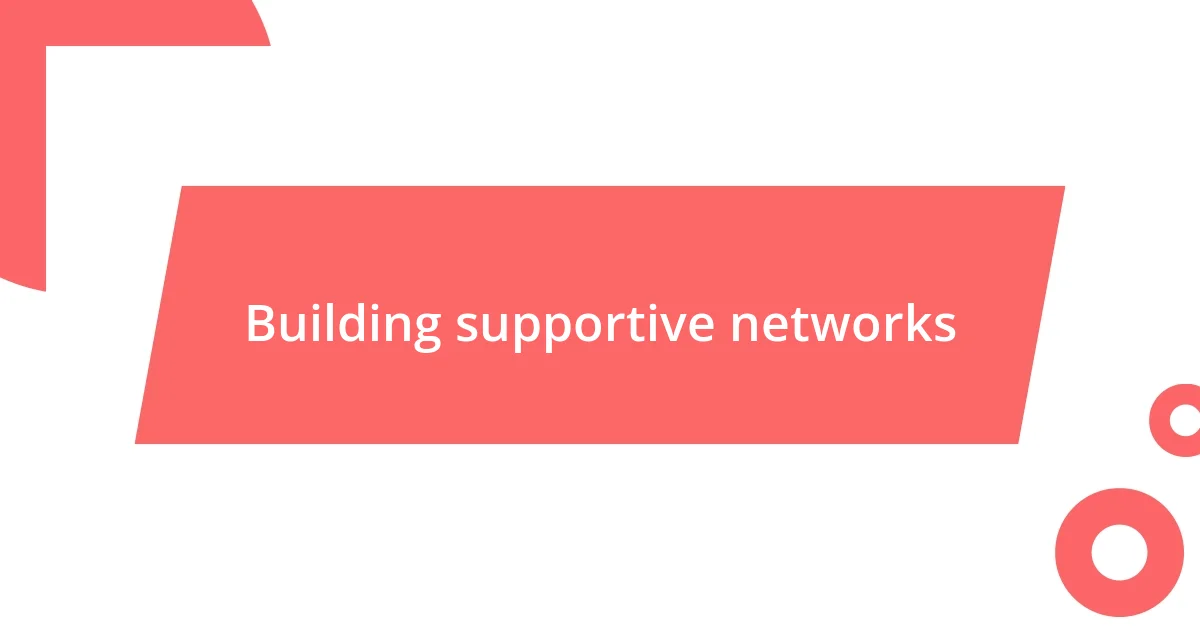
Building supportive networks
Building supportive networks has been a key factor in my journey through gender barriers. I remember when I first joined an online forum dedicated to women in business; I was both nervous and excited. There, I found a treasure trove of advice and shared experiences. For instance, when a member offered to review my presentation for an important meeting, her feedback was invaluable. That simple act of support helped me refine my message and present with confidence.
Connecting with individuals who understand the challenges you face is invaluable. I was part of a mentorship program where my mentor not only inspired me but also encouraged me to take on roles that I had previously doubted I could handle. Can you imagine how transformative it was to have someone believe in my potential? It was like having a safety net that allowed me to embrace risks and step outside my comfort zone without the fear of falling flat.
Furthermore, I learned that being part of a supportive network is not just about receiving help; it’s also about giving back. I’ve found immense satisfaction in fostering connections with others. For instance, one of my peers approached me for guidance on navigating a challenging workplace dynamic. I was more than happy to share my experiences, and in doing so, I realized how much I had grown. Isn’t that the beauty of a strong network? It evolves into a cycle of support that uplifts everyone involved.
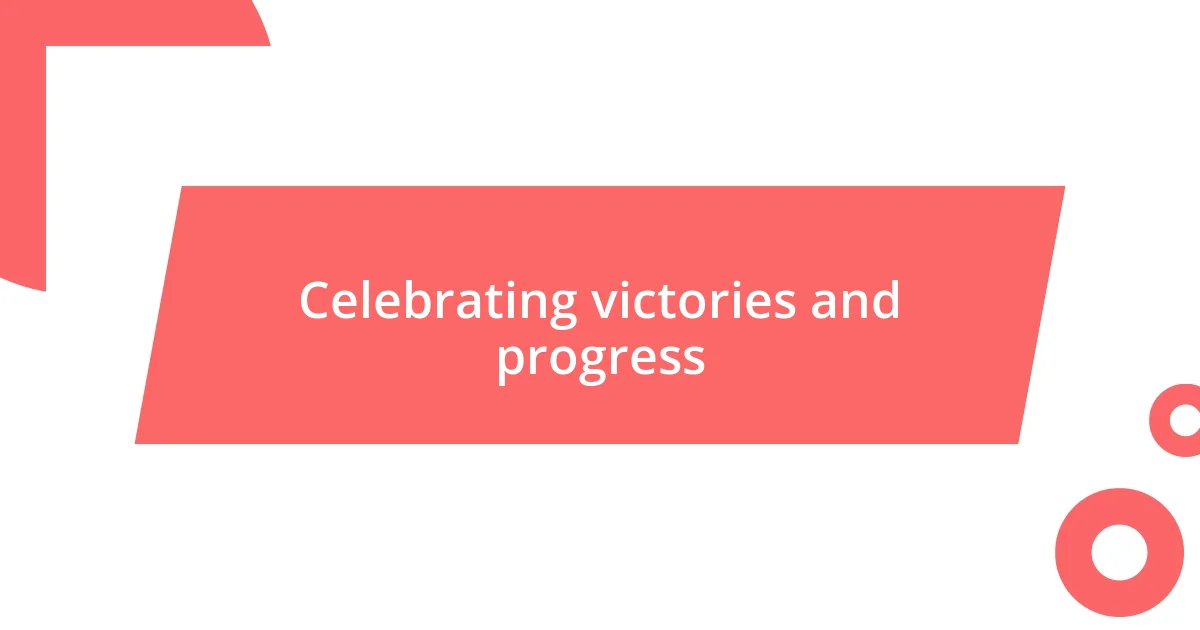
Celebrating victories and progress
Celebrating victories along my journey has been a profound experience. I still recall the moment I landed an opportunity to present at a major conference. I was initially terrified, but as I stood in front of that audience, sharing my insights, I could feel my voice resonating with others. It was a powerful acknowledgment that my journey mattered, and that moment transformed my fear into triumph. Have you ever felt that rush of empowerment when you finally claim your space?
I’ve also learned to recognize the small victories along the way. Each time I spoke up in a meeting, or each time I pushed back against gender biases, I felt a surge of confidence. It’s those incremental achievements that accumulate, fostering a sense of progress. I remember cheering with friends after one particularly tough workweek, acknowledging that each hurdle overcome was a reason to celebrate. Isn’t it amazing how collective recognition can magnify our progress?
Reflecting on progress, I’ve come to appreciate the support and encouragement from allies—those who stand beside you in the journey. I’ll never forget the day my colleague surprised me with a note of appreciation for my contributions. That simple gesture made me realize how vital our networks are in reinforcing our victories. When was the last time you celebrated someone else’s achievement? It’s these moments that remind us of the importance of lifting each other up.
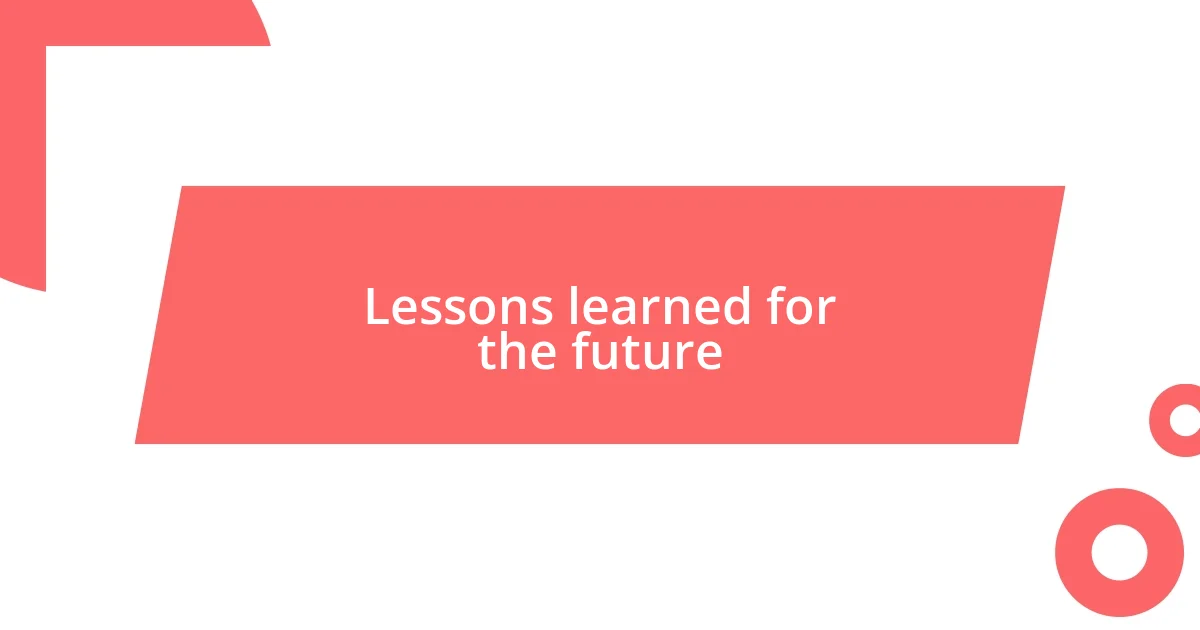
Lessons learned for the future
Through my journey navigating gender barriers, one valuable lesson I learned is the power of resilience. There were days when I felt overwhelmed and doubted my abilities. I remember a particularly tough week when a colleague dismissed my idea in a meeting. Instead of retreating, I used that experience to empower myself. I took a step back, reassessed my approach, and returned with a stronger presentation. Isn’t it interesting how setbacks can often become the impetus for growth?
Another takeaway for me has been the importance of self-advocacy. I realized that if I didn’t speak up for myself, others wouldn’t do it for me. I can recall a time when I hesitated to negotiate my salary at a new job. Finally, I decided to gather data on industry standards and present it confidently during the discussion. The result? A salary that reflected my worth. Have you ever found yourself holding back in negotiations? It’s critical to remember that your voice matters in these conversations.
Lastly, I learned that vulnerability is not a weakness; it is a strength. Sharing my struggles with gender barriers often led to deeper conversations with others facing similar challenges. I vividly recall opening up during a workshop, only to see heads nodding in understanding all around me. That connection reminded me that we’re not alone in our experiences. Why hide our challenges when sharing them can foster real solidarity and healing? Embracing vulnerability can create a space for shared growth and authentic support.












